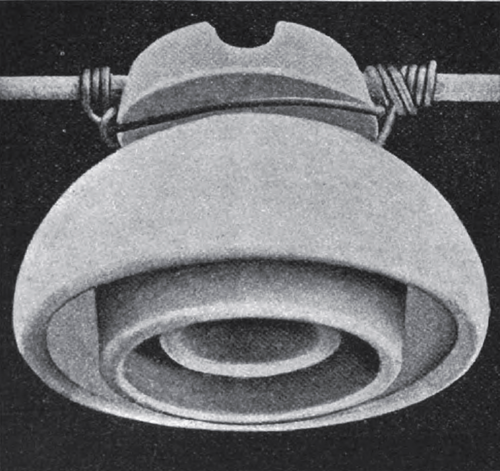[Trade Journal]
Publication: Electricity
New York, NY, United States
vol. 9, no. 21, p. 286, col. 1
Insulators for High Potential Circuits.
It is admitted that high potential circuit are dangerous if not properly insulated. It is the opinion of Capt. Wm. Brophy, chief of the Boston Wire Department, that "the so-called insulating covering in use at the present time for high potential circuits is worse than a delusion and snare. Knowing the worthlessness of the material, it becomes necessary to use the best form of insulating supports. The present style of glass insulators is not what is required. Many of these insulators are only so in name. The very best grade of glass or porcelain should be used, and the double or single petticoat pattern, the form bet suited to the purpose being that which will offer the greatest amount of dry surface in between the wire and the supporting pin.
The qualities of an insulator deemed by Capt. Brophy to be essential for the purpose of high insulation are supplied in the Triple Petticoat China Insulator manufactured by Fred M. Locke. Victor, N. Y.
 |
This insulator is made from the highest grade chinaware in the world. It measures 5 3/4 inches in diameter and 4 inches in height, and has over 12 inches of surface between the wire contact and the supporting pin. About 10 inches of this surface is on the underside of the insulator, out of reach of direct rainfall, where it keeps comparatively dry. The surfaces of the bottom of the insulator are perpendicular, and therefore catch no foreign matter.
By repeated practical tests it has been found that a potential of 85.000 volts is required to puncture the insulator; hence it will carry with safety and economy any voltage that is practicable for use in commercial applications of electric power. The body and glaze of these insulators are of simple earths only, fused together into a vitreous, homogeneous mass at the greatest heat. No lead or other metallic oxide being used in making, the glaze is not a conductor.
These insulators will not craze or crackle on the surface, or "leak," as insulators made of inferior material will do when subjected to variations of temperature. The ware used in the construction of these insulators will stand severe tensile strains or heavy blows without injury, and will not crack or chip from the effects of high potential currents.
